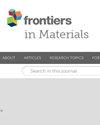Prediction of machine learning-based hardness for the polycarbonate using additive manufacturing
IF 2.6
4区 材料科学
Q3 MATERIALS SCIENCE, MULTIDISCIPLINARY
引用次数: 0
Abstract
IntroductionAdditive manufacturing (AM) is a revolutionary technology transforming traditional production processes by providing exceptional mechanical characteristics.MethodsThe present study aims explicitly to predict the hardness of Polycarbonate (PC) parts produced using AM. The objectives of this study are: (1) To investigate the process parameters that impact the ability to estimate the hardness of PC materials accurately, and (2) To develop a best-performing ML model from a range of models that can reliably predict the hardness of additively manufactured PC parts. Initially, fused filament fabrication (FFF), the most affordable AM technique, was used for the manufacturing of parts. Four process parameters, infill density, print direction, raster angle, and layer thickness, are selected for investigation. A heatmap is generated to obtain the influence of process parameters on hardness. Then, machine learning (ML) techniques create a range of predictive models that can predict hardness value considering the level of process parameters.ResultsThe developed ML models include Linear Regression, Decision Tree, Random Forest, K-nearest neighbor, Support Vector Regression, AdaBoost, and Artificial Neural Network. Further, an investigation has been done that includes choosing and improving ML algorithms and assessing the models’ performance.DiscussionPrediction plots, residual plots, and evaluation metrics plots are prepared to gauge the performance of the developed models. Thus, the research enhances AM capabilities by applying predictive modeling to process parameters and improving the quality and reliability of fabricated components.利用增材制造技术,基于机器学习预测聚碳酸酯的硬度
导言增材制造(AM)是一项革命性技术,它通过提供优异的机械特性改变了传统的生产工艺。方法本研究旨在明确预测使用增材制造技术生产的聚碳酸酯(PC)部件的硬度。本研究的目标是(1) 研究影响准确估算 PC 材料硬度的工艺参数;(2) 从一系列模型中开发出性能最佳的 ML 模型,从而可靠地预测快速成型 PC 零件的硬度。起初,我们使用最经济实惠的快速成型技术--熔融长丝制造(FFF)来制造零件。研究选择了四个工艺参数:填充密度、打印方向、光栅角度和层厚度。通过生成热图来了解工艺参数对硬度的影响。然后,机器学习(ML)技术创建了一系列预测模型,这些模型可以根据工艺参数的水平预测硬度值。讨论绘制了预测图、残差图和评估指标图,以衡量所开发模型的性能。因此,该研究通过对工艺参数应用预测建模,提高了 AM 能力,并改善了制造部件的质量和可靠性。
本文章由计算机程序翻译,如有差异,请以英文原文为准。
求助全文
约1分钟内获得全文
求助全文
来源期刊

Frontiers in Materials
Materials Science-Materials Science (miscellaneous)
CiteScore
4.80
自引率
6.20%
发文量
749
审稿时长
12 weeks
期刊介绍:
Frontiers in Materials is a high visibility journal publishing rigorously peer-reviewed research across the entire breadth of materials science and engineering. This interdisciplinary open-access journal is at the forefront of disseminating and communicating scientific knowledge and impactful discoveries to researchers across academia and industry, and the public worldwide.
Founded upon a research community driven approach, this Journal provides a balanced and comprehensive offering of Specialty Sections, each of which has a dedicated Editorial Board of leading experts in the respective field.
 求助内容:
求助内容: 应助结果提醒方式:
应助结果提醒方式:


